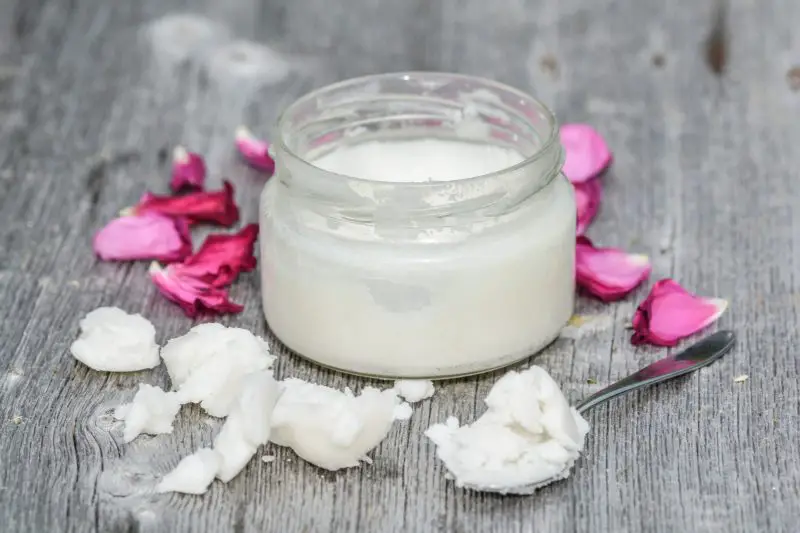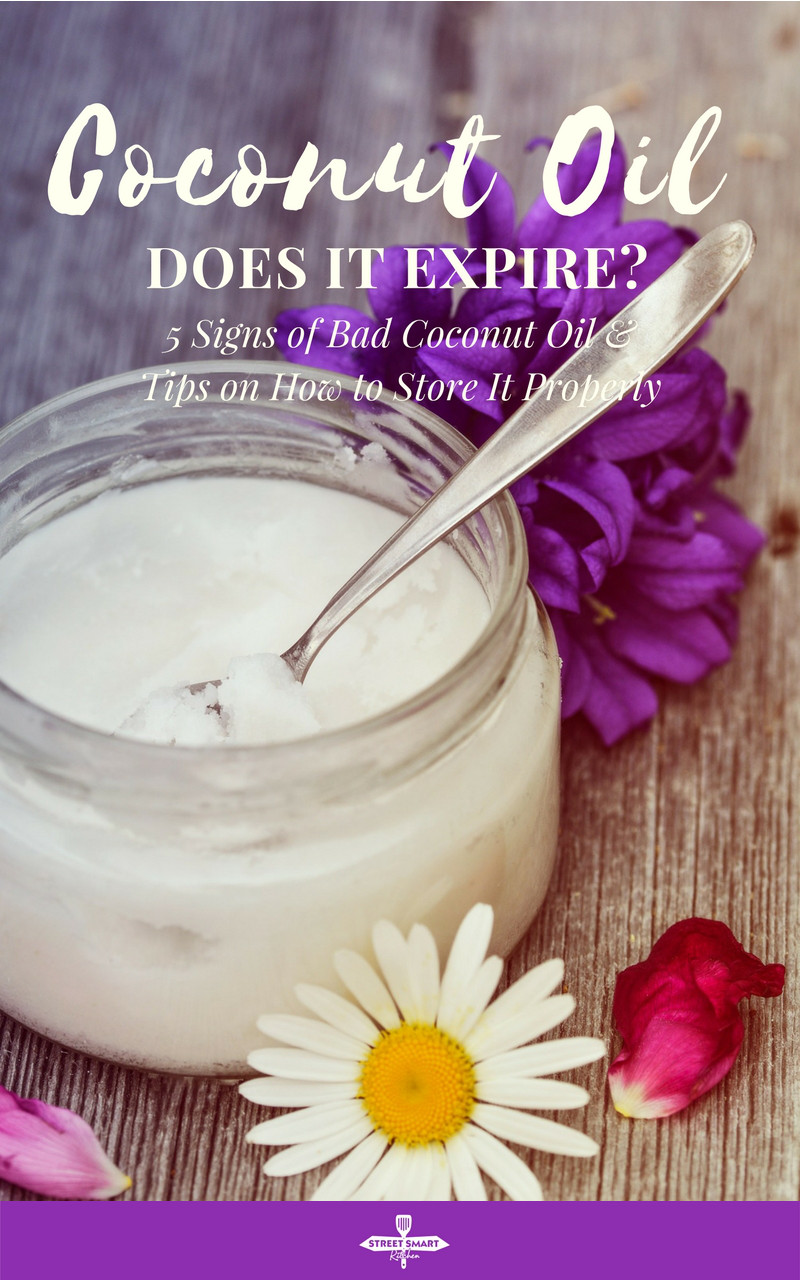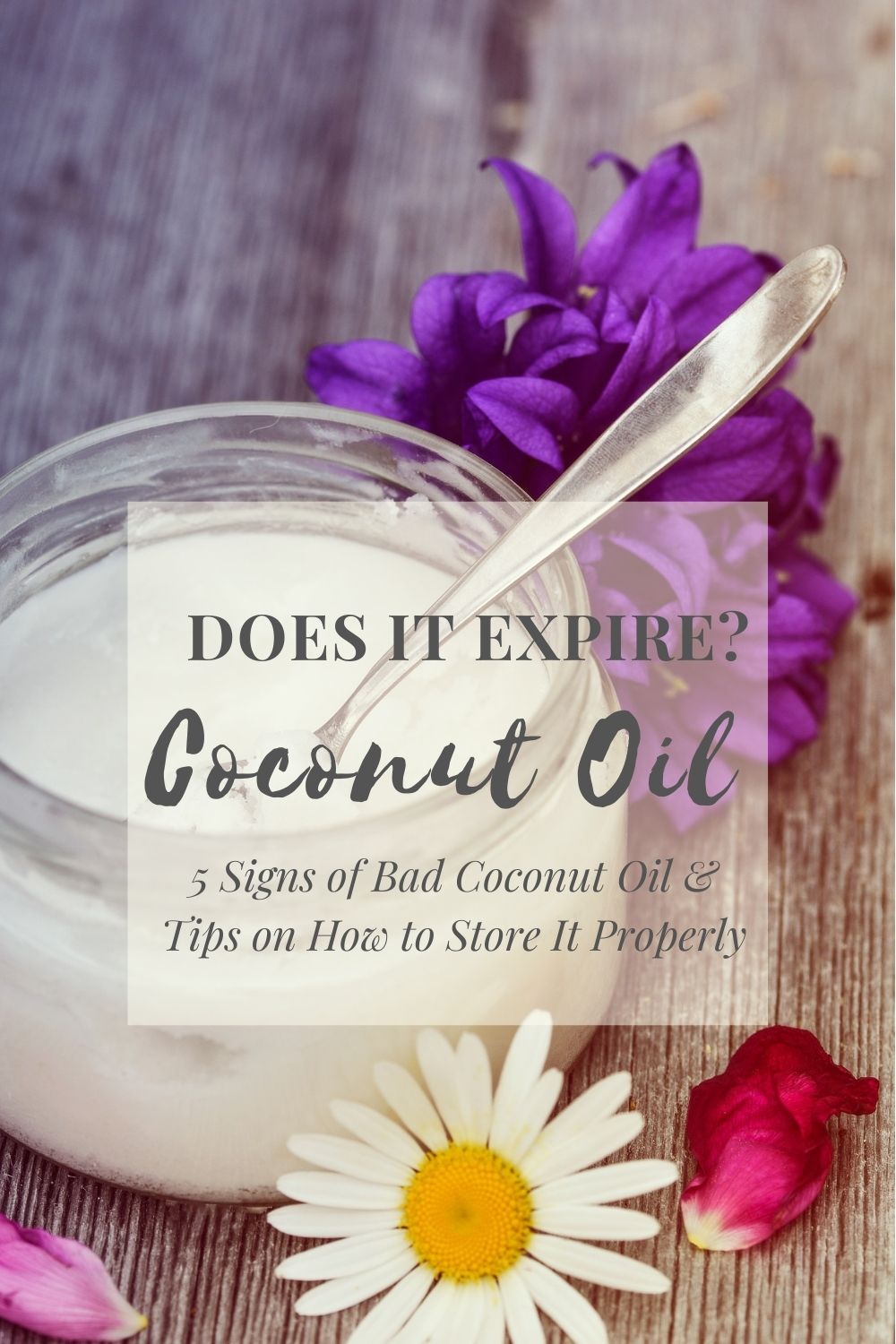Does Coconut Oil Expire? 5 Signs of Bad Coconut Oil
Does coconut oil expire? How long does coconut oil last? Know the signs of bad coconut oil and some tips on how to properly store coconut oil.

[thrive_leads id=’13056′]
A wide range of cooking oils with different uses is available in the largest supermarkets or even the smallest grocery stores near you. Among these cooking oils, coconut oil is known to have the longest shelf life. Does coconut oil expire? Yes. There are two varieties of coconut oil, refined and virgin coconut oil (unrefined). Refined coconut oil can last up to 18 months after production while virgin coconut oil can last up to five years.
Refined coconut oils are processed from copra or the kernel of coconut while virgin coconut oils are extracted from raw coconut meat. Refined coconut oil has a neutral scent and flavor. Virgin coconut oil retains its natural coconut scent and flavor.
Studies show that the type of saturated fat found in coconut oil makes it a healthier choice than other cooking oils. Refined coconut oil has a smoking point of 440°F which makes it a lot more ideal for cooking. Virgin coconut oil has a relatively low smoking point of 350°F. You might not want to use it for stir-fry, but it’s great for tossing up a salad dressing or for baking.
Aside from the mentioned cooking merits coconut oil has – long shelf life, healthy saturated fat and high smoking point, coconut oil has many other uses too. Coconut oil is also a good product for skin and hair care, gentle enough for babies and puppies, and effective for dry skin problems of men and women. With all these great benefits, it’s really ideal to have some at home. You can even buy coconut oil in bulk sizes. So how long can you keep your coconut oil? What are the signs that your coconut oil is already bad?
Five Signs of Bad Coconut Oil
It’s easy to know if your oil has gone bad through appearance, smell and taste. Here are five signs of rancid coconut oil:
#1 Yellow in Color
Good liquid coconut oil should have a clear color and milky white when it solidifies. If it has turned yellow chances are it has already expired.
#2 Blotchy or Chunky
Good coconut oil has a smooth consistency. Your oil is spoiled when it starts to get chunky or if unknown substances are floating on the oil.
#3 Black Oil Spots
Small patches or dark oil spots in your oil container can be mold developing. You’ll never know how bad the mold has already contaminated your oil so it’s better to get rid of the oil already.
#4 Strong Bitter or Sour Scent
Good refined coconut oils have a neutral scent while virgin coconut oils have a slightly sweet coconut scent, if it smells sour or bitter then it’s bad.
#5 Sour Taste
Good refined coconut oils have a neutral flavor while virgin coconut oils retain its natural coconut flavor. Bad coconut oil often develops a sour taste.

[thrive_leads id=’13056′]
Side Effects of Bad Coconut Oil
The after effects of rancid coconut oil will not make you immediately ill, not in the short term at least. The side effects of bad coconut oil will be more apparent in the long run.
Harmful free radicals produced by spoiled oil can damage DNA cells and arteries. They can also act as carcinogens or substances that can cause cancer.
Always remember to practice food safety and never use rancid coconut oils.
How to Properly Store Coconut Oil
Coconut oil takes a long time to oxidize which means it takes a long time to go bad. As mentioned above, refined coconut oil can last up to 18 months while virgin coconut oil can last up to five years. But that doesn’t mean you can just store it any way you want. Any oil stored carelessly can go bad faster than expected.
Here are some tips on how to properly store your coconut oil:
- Store coconut oil in a cool, dark place. Exposure to light, heat, and air can cause quick rancidity of your oil.
- You can store your coconut oil both in the pantry and the refrigerator. Coconut oil can take in two forms depending on temperature, liquid and solid. If you store it at room temperature it will be in its liquid consistency and will solidify if stored in the fridge.
- Store oil in a constant temperature. Fluctuation in temperature can cause chemical reactions in your oil that can make it go bad faster.
- Use clean utensils when scooping your oil. Contamination from used utensils can cause the formation of mold on your oil.
- Always keep your oil sealed to avoid exposure to air that fastens oxidation.
There’s no doubt coconut oil is a popular choice among many. Coconut oil is said to have impressive health benefits despite the claim of American Heart Association about coconut oil being unhealthy. Coconut oil has over 70 uses, you can even use it on your dogs and they love it! How great is that? Store your oil right and enjoy the awesome benefits coconut oil has to offer.

[thrive_leads id=’13056′]
About the Author
Sharon Chen is an Integrative Nutrition Health Coach and author of the Complete Sous Vide Cookbook. She believes food not only brings healing but also connection. As the creator of StreetSmart Kitchen, she aims to make meal prep easier than ever and help you find balance, ease, joy, and simplicity in the kitchen as you improve your well-being.




I have a huge jar of coconut oil that expired in 2018. I think I used it a couple time but that’s it. It still looks good and no orders or discoloration. Can I use it on skin and hair and as a lubercant ?
Hi, I found two jars of organic refined coconut oil in the back of my medicine closet, expiration date 2016, and the label looks worse than the oil! The oil looks and smells as if it were fresh! I’m thinking it’s still good enough! Any thoughts?
I personally would not keep it as it has expired for seven years.
Hi, please advise. I have an unopened jar of (organic extra virgin coconut oil) which is 100% cold pressed raw that I had forgotten about in my bedroom cupboard. Expiry date 03/2022, does this mean that I need to throw it away? 😢😢
Did you open it and check the look and the smell?
I have some that has an expiration date of 2019 and it is still white and smells perfect. I figured even if it might be risky to eat it you could still use it for a moisturizer, shave gel, hair treatment or even to oil a door hinge. lol.
I found a container of coconut oil that I purchased in 2012 and completely forgot about it. It has an expiration date of 2013, so about 10 years old. It smells really good so I was wondering does coconut oil get better with age? It was stored in a dark cabinet and it was not rancid. I used it to fry pork chops yesterday (2022) and the pork chops came out really good.
Hi, My organic unrefined coconut oil doesn’t expire until 1/6/24. It has been solid with tiny white beads in it since I bought it. Is it ok?
I have the same situation too
This has nothing to do with the expiration date or cause of bad coconut oil , but I just wanted to say that another use of coconut oil that changed my life,…. is using it like a feminine wash instead of using soap I use coconut oil , and for shaving that are , I’ve even taken a solid piece and slowly let it rinse my vagina as it melted I inserted it like a tampon but as far as I could a decent size golf ball sized piece after freezing it , and it has been a miracle I was always getting UTI’s and yeast infections everytime I took an antibiotic but I’ve never had an issue like that again in 7 yrs not one plus its lubricating and all natural antibacterial antiviral and antifungal so since I never hear anyone mentioning the amazing use I learned of I want to get it out there to other women experiencing the same problems, it works 100% and you’re always clean balanced and I’ve never even had an odor down there after I started using as my wash since soap is bad for that area
My coconut oil is solid and unrefined. I’ve only had it for a year at most but it’s starting to smell like wax. Does that mean it’s going bad?
The smell could be an indicator of spoiled coconut oil. It’s safer not to consume it as food. Hope that helps.
Yes. Certainly. You better watch out better not fought better not cry santa clause is coming to town. Throw it in the garbage and buy new one or virgin coconut oil lasted for 5 years
Yes. You better watch out you better not fought you better not cry I’m telling you why santa claus is coming to town he sees when you are sleeping he knows when you’re awake he knows when you’ve been bad or good so be good for goodness sake
I have one extra virgin coconut oil manufactured date on 9/10/2017 and expire date on 9/10/2019, smell good and colour also ok. Is it safe to consume? Is it all extra virgin coconut oil can last for 5years? Thanks
Hello, I have the same question. Did you find an answer? I have a completely brand new sealed 1 gallon container of coconut oil. Looks ok. I really don’t want to waste it but not sure if I should get rid of it.
Hi my husband n I have a snack manufacturing company our first line of snack is green plantainchips fried with refined coconut oil but we are having. Problem with the test n smell what method we can use to keep the scent down n if possible get rid of the coconut oil taste mind u it’s very rich
Hello, I’ve been using my coconut oil that expired in 2007 for hair and skin. It has a slight scent of acrid feet. On the top, there was a splotch of greenish-blue but I scraped it off. I’ve been feeling ill and fatigued for the last 10 years and my skin feels like dry sandpaper. Should I toss it?
You should definitely toss it!
Can I put lime leaf in coming coconut oil to make it smell nice
I have a gallon of virgin oil that expired in 2015 but has a coconut smell, good texture (like new). It has always been covered and cool, plus no bitter taste,,,toss it?
hello! i have 10 lb expired coconut oil with no any bad signs.. can i use it to make soaps?
Thank you for sharing these tips. May I know how to preserve homemade coconut oil ? To prolong it shelf life when I sell to consumers. God bless you
Bought vitamin D3 capsules saId to be coconut oil and colocalciferol. They’re too big to swallow so I punctured them. They taste soapy . Since I’ve been taking them, I felt fatigued every day and thought maybe the coconut oil was too old or rancid., yet this article says the unrefined oil,is supposed to taste like soap. I still thinkmtheyre rank, in taste anyway but are they really safe or not with that soapy taste??
Could be you’re taking too much D3, did you have a D3 test before taking it, you may not need it & taking too much can be toxic, causing serious illness.
Hi I ave a organic chemical free tub of virgin cocunut oil with a 2017 end date it still looks just how it was when I bought it I only want to use it on my extremely dry hair will it be safe to continue to use seeing ho it’s not just 5 years expiry
I made my cold pressed coconut oil at home for the first time.
In the process of making an it after squeezing out the liquid, i covered and kept it in a dark place for the oil and the water to divide, i left it for a day and half, only to discover it has a sour smell. The colour is still white and it looks normal but the smell is sour and i kept it in the fridge to make it solid
Is it still safe to use?
Hi Joseph, since your coconut oil has a sour smell, it’s not safe to use anymore. The downside of homemade coconut oil is that it’s not easy to keep it fresh.
Hi.
I make my coconut oil myself. Extracting the flesh, blending, getting the milk and boiling. It’s never white. More like golden brown. But it never keeps longer than 3-4 months. Has this smell like its gone bad. I’m worried.
Hi Jamelle, just like homemade food, anything homemade will not keep long. So it’s best to use it up quickly and make another fresh batch. If it has a bad smell, it’s probably is spoiled.
How can I persevere home made coconut oil ?
If the expiration date is passed and has small white chunky beads, can I still use it for skin and hair care? Or personal lubricant?
Hi Vicki, if your coconut oil starts to get chunky, it’s already bad. I wouldn’t recommend you use it at all. Better to toss it.
I like to give my puppy about 1 teaspoon of coconut oil in his food i have a jar that l put in my cupboard is it normal for in too be liquid i do keep my home fairly warm if that makes a difference
It liquifies in warmer temperatures.. but it’s fine. I put a teaspoon in my pup’s food, too. 🙂
How can I dispose of coconut oil that I no longer want to use – 32 ounces .?
Hi Nora, did you get an answer to this? I have the exact same question! I want to dispose of it in a way that is most environmentally friendly and am at a loss.
You’ve probably tossed it by now but just in case ……..
Old oil can be used to protect and preserve outdoor wood, for example, at the base of posts in a wood fence, it waterproofs them and they won’t rot.
I’ve also used as a re-conditioner on worn-looking leather boots and purses, use a soft cloth to smooth it on, leave it for an hour or two then polish off. Waterproofs the leather, rain just beads off! Don’t use on purses if it has a rancid odor though.
Can coconut oil be used for sunbathing
Simply want to say your article is as amazing. The clarity on your put up is just excellent and i can assume you’re a professional on this subject.
Well together with your permission let me to grab
your RSS feed to keep updated with drawing close post.
Thank you one million and please carry on the enjoyable work.
I love using coconut oil in my hair and skin . I want to take some with me when I travel , any suggestions how to do that without taking my big jar? Can I use a small travel size plastic bottle or should I use a glass one?
Hi Eliza, it’s a good idea to take some coconut oil with you when traveling, something I always do. I usually reuse a small glass jar for the coconut oil. For example, you could use an empty eye cream jar for the purpose. I’ve also used a travel-sized plastic bottle before. Please note that don’t fill your bottle all the way to the top. Leave a bit of room since coconut oil will solidify when it’s cold and melt when it’s warm.
Purchased 100% refine coconut oil Expiration date 6/2021 but left it in hot car and it’s turned liquid and yellow in color so can it still be used.
Hi Laura, if it has turned yellow, I wouldn’t recommend you use it. Good liquid coconut oil should have clear color and milky white when it solidifies. If it’s yellow, it’s probably already bad.
My pure coconut oil smells like ghee is it possible it smells like that?
Hi Afy, I personally never encountered any good coconut oil smells like that. It should have a neutral or sweet coconut scent.
I bought some organic virgin coconut oil from a family I befriended whilst on holiday in Indonesia. It was refined into oil fresh while I was there. They put the oil into used plastic water bottles. Indonesia is a poor country and storing like that was normal for them. I transferred it into copper drinking bottles that I had used for water because I thought the plastic bottles may leak during transit back to the UK.
Unfortunately the bottles have left my oil with a copper taste and a slightly yellow colour. I only use the oil for applying to my skin not for cooking. Would it be safe to use?
One jar of Grace virgin coconut oil expiry date feb. 2019. Other jar expiry date 2018 I am afraid of carcinogen and other things if it has expiry date that means should not use it . Even though I read that virgin coconut oil last 5 years after expiry date
If part of my coconut oil have black spots but I got rid of those areas, is the rest alright to eat?
Throw it out.
The whole thing.
my oil has expiry date 2017 but has been in the cupboard under the stove (bottom shelf) in the dark……….it has always been solid but has now seperating and the top in liquid………….should I toss it and start again or is it okay. I can send a photo
Hi Janelle, since it’s been expired for two years, I’d suggest you toss it. You could also check if your oil has any of the five signs. If not and you don’t want to toss it, consider other uses than eating it. Hope that’s helpful.
The “studies” link above is not a study. It’s just a properties sheet of coconut oil.